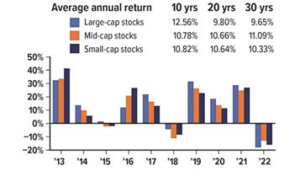The U.S. stock market struggled in 2022, with the S&P 500 index ending the year down more 19.4%.1 The S&P 500, which includes stocks of large U.S. companies, is generally considered representative of the U.S. stock market as a whole, and it is a good benchmark for broad market performance. But there are thousands of smaller companies, and many of those held onto their stock value better during the market conditions of 2022.
The S&P MidCap 400, which includes midsize companies, ended the year down 14.5%, while the S&P SmallCap 600, which includes smaller companies, was down 17.4%.2 Although these were losses, it was the first year since 2016 that midsize and small companies outperformed large companies (in this case, by having smaller losses). While large companies have registered the highest average annual returns over the last decade, midsize and small companies have been stronger over longer periods (see chart).
Extending Your Reach
As these trends demonstrate, companies of different sizes tend to perform differently in response to market conditions. This suggests that holding stocks in companies of varied sizes could help diversify the stock portion of your portfolio and allow you to pursue a broader range of growth opportunities. Diversification is a method to help manage risk; it does not guarantee a profit or protect against investment loss.
The most convenient and comprehensive way to diversify by size is through mutual funds or exchange-traded funds that track indexes based on market capitalization, calculated by multiplying the number of outstanding shares by the price per share. There is no standard classification system, but Standard & Poor’s indexes offer a helpful comparison and are used as benchmarks for many funds.3
S&P 500: $14.6 billion or more
S&P MidCap 400: $3.7 billion to $14.6 billion
S&P SmallCap 600: $850 million to $3.7 billion
Russell indexes are also commonly used to construct funds based on market capitalization. The Russell 1000 includes large and midsize companies, while the Russell 2000 is a comprehensive small-cap index. Actively managed funds focusing on market capitalization typically include stocks chosen by the fund manager rather than following an index.
Stability, Growth, and Volatility
Stocks of larger companies, or large caps, are generally considered more stable than the stocks of smaller companies, because their size can help them weather rough economic times — as demonstrated by their strong performance during the pandemic. Large caps may provide solid long-term returns, but they typically have lower growth potential, because they have already experienced substantial growth. Many large U.S. companies have heavy overseas exposure, which makes them more sensitive to global economic forces, one reason they struggled in 2022.
Performance in Three Sizes
Even with poor performance in 2022, large-cap stocks have provided the highest returns over the last decade. However, mid caps were the leader over the last 20- and 30-year periods, with small caps not far behind.

Source: Refinitiv, 2023, for the period 12/31/2012 to 12/31/2022. Large-cap stocks are represented by the S&P 500 Composite Total Return Index, mid-cap stocks by the S&P 400 MidCap Total Return Index, and small-cap stocks by the S&P 600 SmallCap Total Return Index. Expenses, fees, charges, and taxes are not considered and would reduce the performance shown if they were included. The performance of an unmanaged index is not indicative of the performance of any particular investment. Individuals cannot invest directly in an index. Rates of return will vary over time, particularly for long-term investments. Actual results will vary.
Mid caps may have greater growth potential than large caps, and midsize companies might react more nimbly to changes in the business environment. Mid caps are associated with higher risk and volatility than large caps, but are considered more stable than small caps.
Small-cap stocks might offer the highest growth potential of the three classifications, because they have the furthest to grow and are more likely to react quickly to market opportunities. However, they are typically the most risky and volatile class of stocks.
The investment return and principal value of stocks, mutual funds, and ETFs fluctuate with market conditions. Shares, when sold, may be worth more or less than their original cost.
Mutual funds and ETFs are sold by prospectus. Please consider the investment objectives, risks, charges, and expenses carefully before investing. The prospectus, which contains this and other information about the investment company, can be obtained from your financial professional. You should read the prospectus carefully before investing.
1-3) S&P Dow Jones Indices, 2023
Copyright 2006- Broadridge Investor Communication Solutions, Inc. All rights reserved.
Broadridge Investor Communication Solutions, Inc. does not provide investment, tax, or legal advice. The information presented here is not specific to any individual’s personal circumstances.
To the extent that this material concerns tax matters, it is not intended or written to be used, and cannot be used, by a taxpayer for the purpose of avoiding penalties that may be imposed by law. Each taxpayer should seek independent advice from a tax professional based on his or her individual circumstances.
These materials are provided for general information and educational purposes based upon publicly available information from sources believed to be reliable—we cannot assure the accuracy or completeness of these materials. The information in these materials may change at any time and without notice.
*Non-deposit investment products and services are offered through CUSO Financial Services, L.P. (“CFS”), a registered broker-dealer (Member FINRA / SIPC) and SEC Registered Investment Advisor. Products offered through CFS: are not NCUA/NCUSIF or otherwise federally insured, are not guarantees or obligations of the credit union, and may involve investment risk including possible loss of principal. Investment Representatives are registered through CFS. Coastal Federal Credit Union has contracted with CFS to make non-deposit investment products and services available to credit union members.
CFS representatives do not provide tax or legal guidance. For such guidance please consult with a qualified professional. Information shown is for general illustration purposes and does not predict or depict the performance of any investment or strategy. Past performance does not guarantee future results.
Trust Services are available through MEMBERS Trust Company. CFS* is not affiliated with Members Trust Company.






